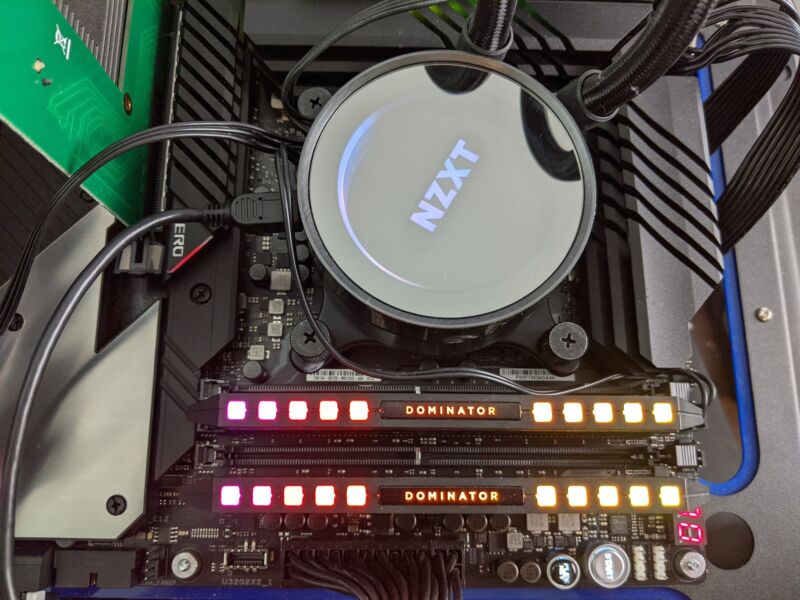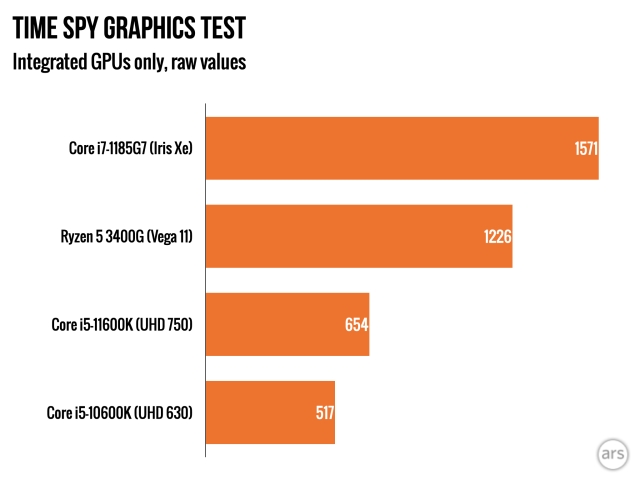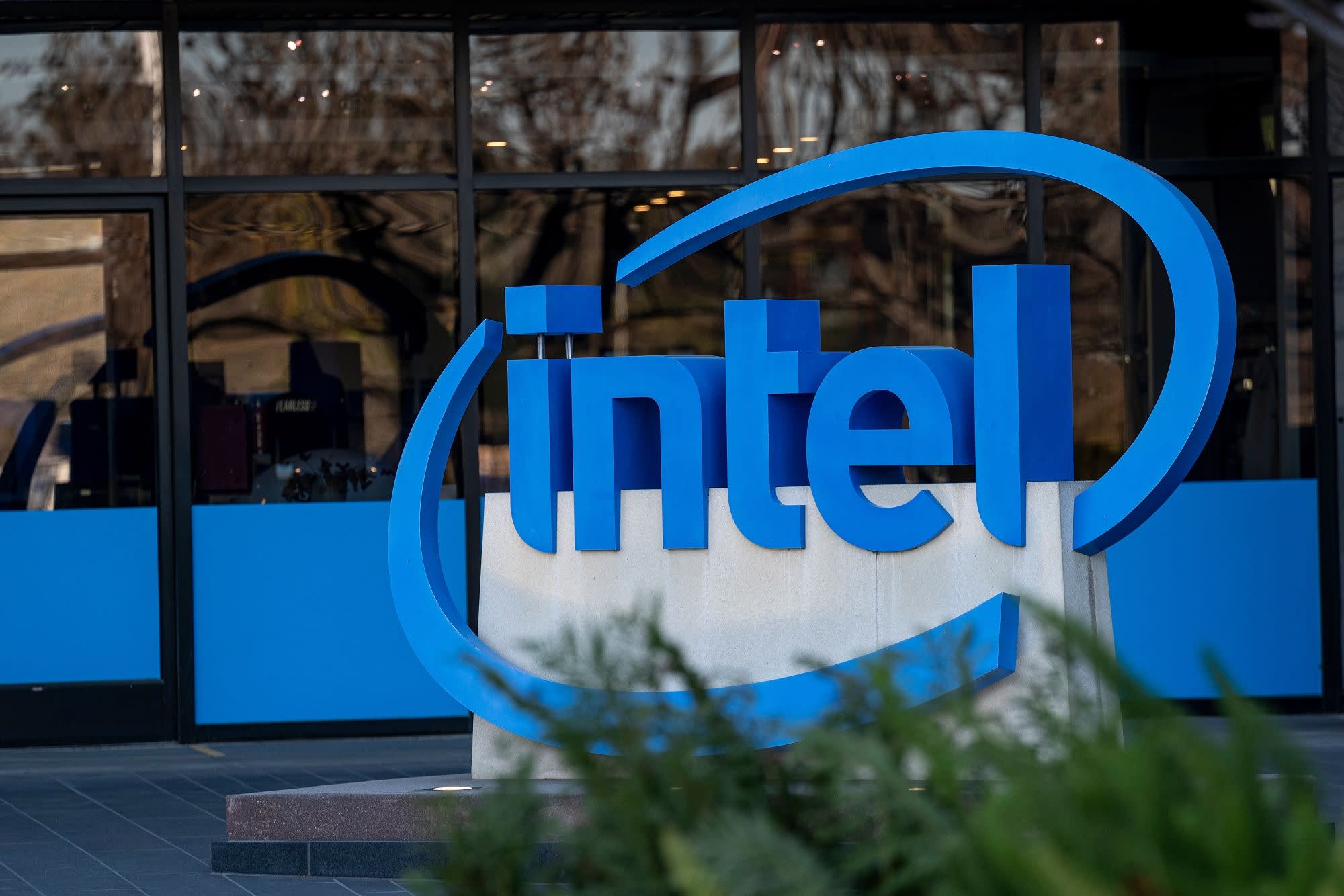
Today marks the start of retail availability for Intel's 2021 gaming CPU lineup, codenamed Rocket Lake-S. Rocket Lake-S is still stuck on Intel's venerable 14 nm process—we've long since lost count of how many pluses to tack onto the end—with features backported from newer 10 nm designs.
Clock speed on Rocket Lake-S remains high, but thread counts have decreased on the high end. Overall, most benchmarks show Rocket Lake-S underperforming last year's Comet Lake—let alone its real competition, coming from AMD Ryzen CPUs.
Our hands-on test results did not seem to match up with Intel's marketing claims of up to 19 percent gen-on-gen IPC (Instructions Per Clock cycle) improvement over its 10th-generation parts.
Multithreaded CPU performance
-
Core i9-11900K has two fewer cores than last year's i9-10900K, resulting in poorer multithreaded performance.Jim Salter
-
In Passmark testing, i9-11900K ekes out a narrow victory over last year's i9-10900K—Intel's 19% gen-on-gen IPC uplift cancels out the 20% decrease in core count.Jim Salter
-
i9-11900K can't quite catch up to last year's i9-10900K in multi-threaded Geekbench.Jim Salter
It shouldn't come as an enormous surprise that Core i9-11900K underperforms last year's Core i9-10900K in many multithreaded tests—this year's model only offers eight cores to last year's 10. On the plus side, Intel's claims of 19% gen-on-gen IPC are largely borne out here, mostly balancing the loss out in Passmark and Geekbench.
-
i5-11600K improves significantly over last year's equivalent.Jim Salter
-
Unlike its Core i9 big brother, this year's Core i5 muscles handily past last year's model in the not-very-demanding Passmark multithreaded test.Jim Salter
-
This year's i5 significantly outperforms last year's on multithreaded Geekbench, though Ryzen 5 5600X keeps the lead.Jim Salter
This year's Core i5 makes a much better showing than its Core i9 big sibling. In Cinebench R20, Core i5-11600K almost catches up with Ryzen 5 5600X, and it easily dominates last year's Comet Lake i5 equivalent. It doesn't catch up to its Ryzen competitor in Passmark or Geekbench multithreaded tests, but it outpaces last year's model all the way around.
This represents the clearest, most significant generation-on-generation victory we saw out of Rocket Lake-S.
Single-threaded CPU performance
-
i9-11900K sets a new record for single-threaded Cinebench R20 performance—if by a razor-thin margin.Jim Salter
-
i9-11900K edges just past its Ryzen 9 competition in single-threaded Passmark.Jim Salter
-
i9-11900K sets a new record for single-threaded Geekbench, edging past Ryzen 9 5900X.Jim Salter
Core i9-11900K manages to set new records for single-threaded performance—if by razor-thin margins, in Cinebench R20 and Passmark. Geekbench 5 gives the i9-11900K a more noticeable victory.
As always, we advise readers not to make too much hay of this. Few real-world workloads are genuinely single-threaded, and even the largest margins shown here are thin.
-
Our i5-11600K didn't quite catch up to its Ryzen 5 counterpart, but it easily won over last year's i5-10600K.Jim Salter
-
i5-11600K edges slightly past Ryzen 5 5600X in single-threaded Passmark.Jim Salter
-
i5-11600K takes the lead in single-threaded Geekbench 5, narrowly outpacing Ryzen 5 5600X and leaving last year's i5 in the dust.Jim Salter
Core i5-11600K gets neck and neck with Ryzen 5 5600X on single-threaded benchmarks, and it does so while scoring more significant victories over last year's Core i5-10600K. For the most part, this is the same relationship we saw between Rocket Lake-S, Zen 3, and Comet Lake in the previous Core i9 versus Ryzen 9 charts.
Gaming performance
-
Time Spy limits multithreaded processing, which eliminates the major advantages of both Ryzen 9 models and last year's 10-core i9.Jim Salter
-
Rocket Lake-S's IPC improvements push i5-11600K to the top of the charts in Time Spy.Jim Salter
-
Time Spy Extreme—which allows for higher core-count usage and more advanced CPU optimized math libraries—disapproved strongly of our i9-11900K.Jim Salter
Before you get too excited about these results, we need to remind you that this is the Time Spy CPU test only—it focuses on modeling physics in ways that don't lend themselves to GPU rendering. Assuming that typical games would see similar decreases in overall frame rate would be a grave error.
As we noted in the gaming-focused Spring 2021 System Guide, the CPU has minimal impact on AAA gaming—frame rate in most games is determined almost entirely by GPU. If the only thing you have open on your PC is the game, you only need to meet a minimum CPU threshold—roughly speaking, "2015-era i5 or better." However, the more extra tasks you load onto your system—browser tabs and email clients open in the background or, worst of all, stream-capturing your own games—the more CPU horsepower you'll need to keep things moving.
We saw effectively no change in the complete Time Spy score between 10th- and 11th-generation CPUs, as tested with an RTX 2060 Super GPU—and we didn't expect to. Yes, the single-threaded performance increased significantly; no, that doesn't generally have a large impact on gaming performance.
Integrated GPU performance

Rocket Lake-S gets a small but noticeable upgrade to its integrated graphics performance—the 10th-generation Core CPU's UHD 630 graphics gets bumped up to UHD 750. While it is an improvement, it's nothing to write home about—if you were hoping for an equivalent to Intel's Iris Xe graphics in Tiger Lake laptop CPUs (or AMD's Vega 11 in desktop APUs) you'll be sorely disappointed.
A modest GeForce GTX 1060 is good for a Time Spy Graphics score of roughly 4,000. Intel's flagship i7-1185G7 laptop CPU manages nearly half that at 1572, with AMD's Vega 11 lagging noticeably behind at 1226. Rocket Lake-S' UHD 750 comes in at a yawn-inducing 654—roughly half the performance of Vega 11, and roughly one-third the performance of Iris Xe.
Although the UHD graphics are sorely underwhelming, we should point out that they do at least exist. Competing Ryzen CPUs in the retail channel offer no integrated graphics at all—and with the current supply shortages and ugly price hikes in discrete GPUs, that can mean paying a nasty premium in full-system builds that aren't supposed to focus on gaming in the first place.
The Link LonkMarch 30, 2021 at 08:00PM
https://ift.tt/31y801y
Intel 11th-generation Rocket Lake-S gaming CPUs did not impress us - Ars Technica
https://ift.tt/2YXg8Ic
Intel

No comments:
Post a Comment